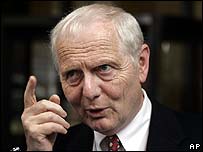

The search for Annan's successor
By Laura Trevelyan
BBC News, New York
Ban Ki Moon (right) is one of the headline candidates
UN Secretary General Kofi Annan steps down at the end of this year and already the search for his successor has begun. Yet for such an important job - the world's chief diplomat - the selection process is most mysterious.
It's a tremendously significant role, the world's chief diplomat, a figure with tremendous moral authority, with all the problems of the globe ending up on their doorstep.
Yet there is no job description, no formal job interview, and the final decision is made firmly behind closed doors. The rest of the UN will simply be asked to rubber stamp the final decision.
Power really lies with the five permanent members of the council - the UK, France, Russia, China and the US - who have the ability to veto decisions.
"This time round, a lot depends on whether the Americans and the Chinese can do a deal early on - if so, it may be over quite quickly," Edward Mortimer, Kofi Annan's director of communications, told BBC World Service's Analysis programme.
"But if they differ strongly, you could see quite a cliff-hanger."
Last word
But there are mutterings of discontent in the corridors of the UN from the developing world countries, who feel that it is unfair Mr Annan's heir should be chosen this way.
The challenges facing the next Secretary General are immense - from reforming the organisation in the wake of the oil-for-food scandal, to defining the UN's role in a turbulent world.
We want a person of the right calibre, with the right political and diplomatic skills
UK UN ambassador Sir Emyr Jones Parry
"There are calls from the general membership for more transparency and more engagement from the general assembly - which I think is a fair call," said Oh Joon, South Korea's deputy permanent representative to the UN.
But the word among diplomats on the corridors is there will not be a radical change in the way the secretary general is chosen, at least this time round.
While there might be more consultation with the 191 countries that make up the UN, the Security Council will still have the last word.
"I tried early on in this process to persuade my colleagues that for a job of this sort, nothing was more natural than to have a job description - and people recoiled in horror," said one of the kingmakers, Britain's UN ambassador Sir Emyr Jones Parry.
"But the truth is, we're not very precise about it. The United Kingdom is precise - what we say is we want a person of the right calibre, with the right political and diplomatic skills."
But there is no agreement on what kind of skills Kofi Annan's successor needs. Are they to represent the best interests of humanity, or to do what they are told?
Regional candidates
The notion of the secretary general as a "secular pope" comes from the early 1960s and the era of campaigning UN leader Dag Hammarskjold, who saw himself as an advocate for the citizens of the world.
But James Traub, who has written a book on Kofi Annan and the UN, said he believes the security council will want someone far more discreet - more secretary than general.
Vaira Vike-Freiberg would be the first female secretary general
"If there is a big Secretary General, he begins occupying some of the space of the security council," he explained.
"They don't want him to be able to sway public opinion, to limit their own mobility. So the one thing that the five members of the Security Council have in common is they want to see a secretary general of modest dimensions."
To further complicate matters, Asian countries believe it is their turn to provide the next secretary general, according to the informal agreement whereby the job rotates around the regions of the world.
Mr Annan, who is visiting the region this week, has already met Ban Ki Moon, South Korea's foreign minister who is a candidate for the position.
There are two other declared candidates from Asia - Surakiart Sathirathai, Thailand's deputy Prime Minister, and Jay Dhanapala, a former UN arms control expert who oversaw the Sir Lankan peace talks.
Mr Traub described these names as "much of a muchness".
"They are very well-behaved - diplomatic figures without a great deal of force," he said.
This has encouraged the East Europeans, who point out that no-one from their region has ever held the post.
The Americans briefly flirted with the idea of backing Aleksander Kwasnieski, the former President of Poland, while Vaira Vike-Freiberg, President of Latvia, would like to be the first woman in the job.
Race
Meanwhile, there is a dark horse candidate - Prince Zaid Hussein, Jordan's ambassador to the UN.
His supporters argue the Middle East counts as being in Asia.
Dag Hammarskjold died while trying to help peace in the Congo
"There has been quite a lot of lobbying in capitals by those people already declared - that's part of it," said Ambassador Emyr Jones Parry.
Traditionally, he says, this is a race where the early runners tend to be overtaken at the finish.
The security council will begin discussing the next Secretary General in earnest in June.
There's some pressure for a decision to be made by September, when world leaders meet to begin the work of the next general assembly. But it could go right to the wire, in December.
Whoever it is will join the portrait gallery of previous secretary generals at the visitors' entrance of the UN, their image captured in a silk tapestry.
For all the imperfections of the selection process - which are many - Kofi Annan's successor will nonetheless be a global figure looked upon to provide leadership as the world lurches through its many crises.
No comments:
Post a Comment